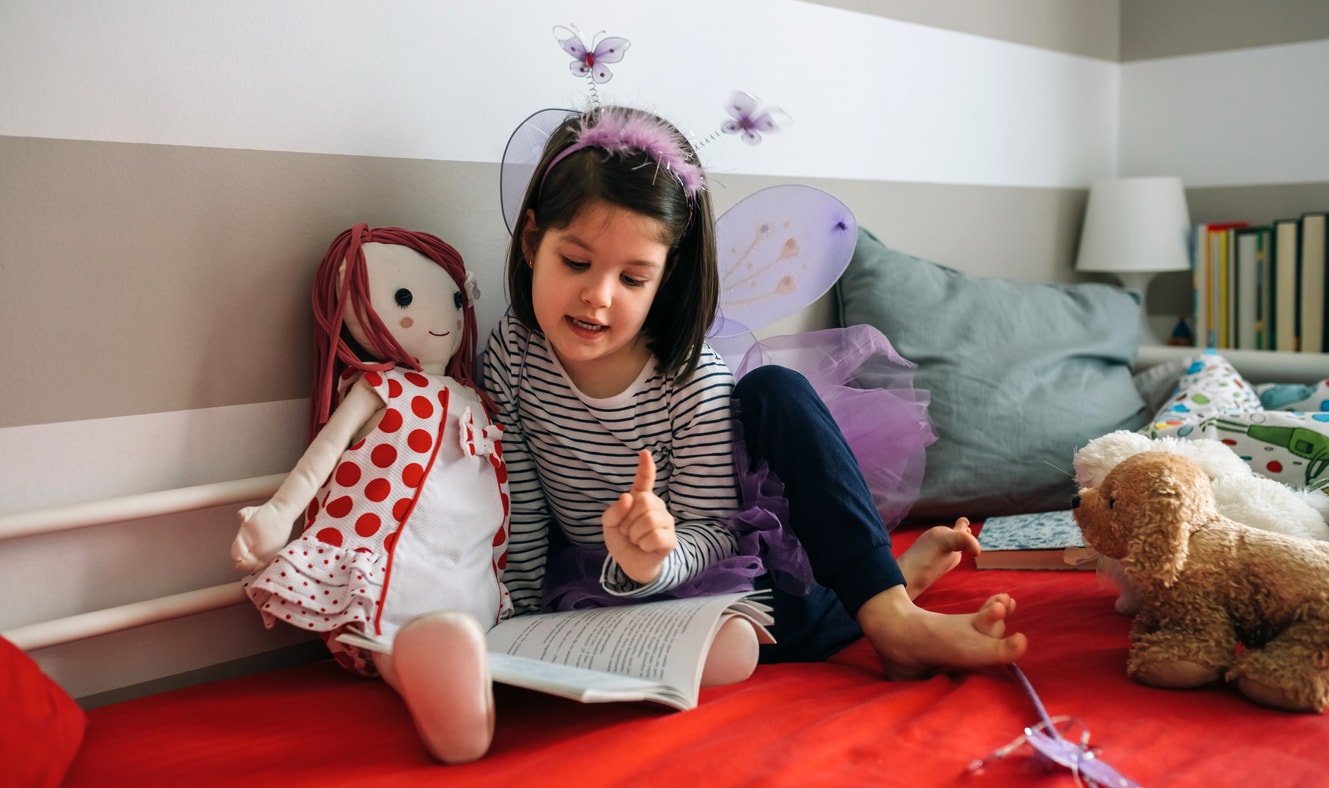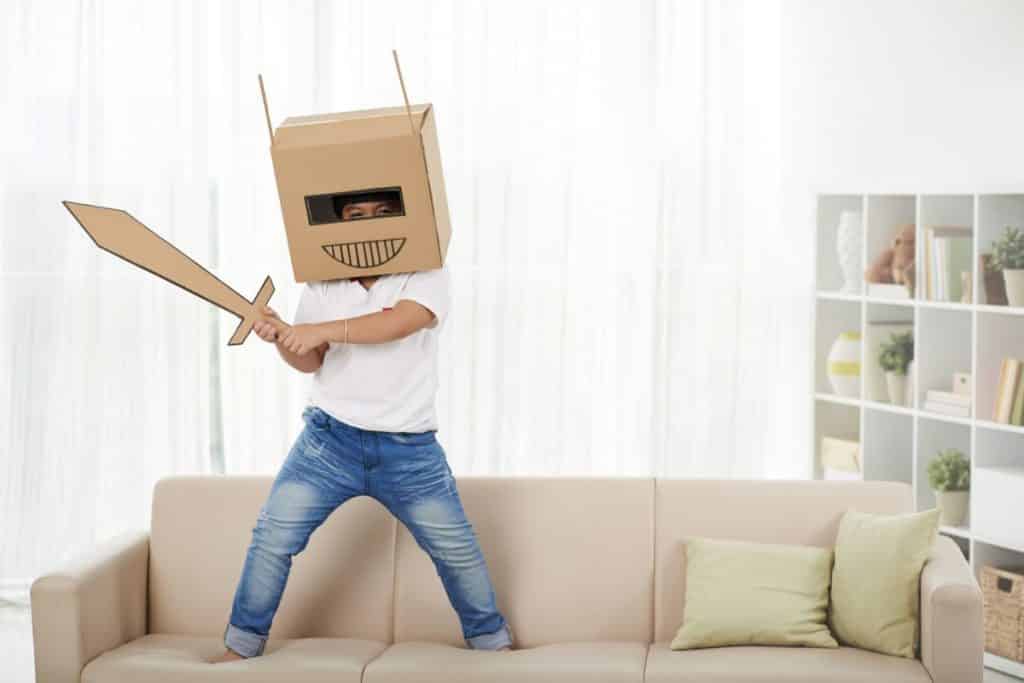If you have a young child or have seen children at play, you’re probably familiar with pretend play, sometimes called imaginative or make-believe play. You might witness role-play where a child becomes a doctor or superhero or when they pretend that a banana is a phone or a block is a piece of cake. Pretend play is declining, partly because, as a society, we are getting busier and technology is improving (and our time spent using it is increasing). There is also less value held in free play, which is seen as unstructured, unproductive, and even trivial.1 It’s easy to overlook the value of imagination. But pretend play is an essential pillar in children’s development and well-being that occurs naturally at a certain age.
What Is Pretend Play?
Play is a naturally occurring behavior in childhood, which means no one has to teach a child how to play! It is an activity where children play pretend — that they are other people (mom, dad, a chef, a vet), that one object represents something else entirely, or that make-believe things exist (hello unicorns!). Perhaps you can even see them copying something they have witnessed in the world around them.2 Being able to pretend demonstrates a child’s cognitive skills. If you watch closely, you can see how their imagination guides their play and how they access memories, ideas, and thoughts to structure their activities.5,6
The 6 Benefits of Pretend Play

Why is imagination so important? Not only is pretend play fun for your little humans, but it is also linked to a host of benefits, such as:3,4
1. Communication Skills
In pretend play, kids get to play with language without pressure, as there are no tests or lessons to learn. When they role-play and get into character, they must consider what another character thinks or feels. They might change their language to suit the situation or even change how they talk to represent a certain character.
2. Self-Regulation
As they explore (whether playing solo or with siblings/friends), it’s natural that things might go awry or they get frustrated. However, play gives them a chance to work through their feelings or practice their emotional expression.
3. Problem-Solving and Conflict Resolution
Similar to the previous point, as children navigate their environment or explore games or activities, things might not go how they expect. So, they will have ample opportunity to problem-solve without adults’ interference, which is where the real growth and learning happens. When grown-ups aren’t around or structuring the play, children also get to practice resolving conflict or sorting out issues with their peers/family.
4. Social and Emotional Skills Development
Not only do they learn how to resolve conflict but they also learn about turn-taking, sharing, and working in groups for a shared goal or outcome. When role-playing, kids also develop their empathy because they step into someone else’s shoes and consider the needs/feelings of another person to help them “get into” the role. They can also practice empathic roles like doctors, nurses, vets, etc.
5. Creativity
Children who play more elaborate games or make-believe are more innovative and creative as adults. This is because pretend play allows children to act out different scenarios. They can also use their imagination to inspire the game and the outcome.
6. Confidence and Independence
When our children are given a chance for free play, they can direct themselves and take risks. This autonomy helps them feel like they are capable, and they feel good that they are in charge of their world. They’re not just simply exploring their toy room and making up games!
What Is the Right Age To Introduce Imaginative Play?
You don’t exactly have to introduce pretend play at a certain age, as it’s something children naturally do. In fact, pretend play is consistent and exists across all cultures (although the content and focus of the play itself are different).2
So, when does imaginative or pretend play start? It typically begins around 12-18 months of age, when object permanence is learned. Object permanence is a skill where children understand that despite being unable to see an object any longer, it still exists in the world and hasn’t just disappeared.2 This is why peek-a-boo is such a hit with toddlers — until they develop object permanence, they think you are literally magic when you disappear behind your hands!
Children of this age usually start with object substitution, where an object represents something else. For instance, a block is an animal, or a cup is a hat. Pretend play peaks around 3-5 years of age and their play shifts. They tend to focus on pretend identities or play out and explore complex social scenarios.2
5 Tips To Encourage Imaginative Play at Home

Although pretend or make-believe play naturally occurs, we still need to give our children the opportunity to play since it’s so important. Some strategies and tips to encourage imaginative play include:2,3,4
1. Less Structure
Try to dial back pressure and over-scheduling to allow your child an opportunity to get stuck into imaginative play. But also . . . try not to structure their play. If an adult guides a child’s play, they won’t get the same benefits as using their imagination or lived experiences to drive the activity (and explore what they want and need for optimal development).
2. Less Is More
You also don’t want to overload your child’s playroom or toy box. They might struggle with toy selection and end up with analysis paralysis, never getting around to the playing itself. In addition, if you have too many toys (one for every occasion), they won’t need to use their imagination, get creative, or think outside the box.
3. Avoid Correcting Your Child
Step back when they play, and don’t correct them if they are holding something wrong or using it in a nonconventional way. Their imagination is doing all the work — you don’t want to disrupt that process. Try as best as you can to leave them to play with their toys in ways that are meaningful to them (even if they don’t make sense to you).
4. Strewing
It’s a bit of a strange word, but strewing essentially means laying out a whole bunch of toys in an engaging way or in a scene to encourage play. You don’t have to tell your child how to play with the toys. There is no right or wrong way for them to play! It’s just a way to entice them to explore their toys in a new way.
5. Provide “Open-Ended” Toys
Open-ended toys don’t have an “end” or need to be played with in a particular way. This is the opposite of close-ended toys, which have specific instructions, rules, or a clear ending point. Examples include a coloring book (close-ended) versus blank paper (open-ended) or a puzzle (close-ended) versus an empty box (open-ended). You don’t need entirely open-ended toys, but they allow for more creativity or representative play.
Play is simple, yet complex. It’s something children naturally engage in at a certain age, but the actual process of pretend play requires cognitive, emotional, social, and even physical skills. The wide range of skills a child needs to pretend play is why it’s so important for their overall well-being and development. It’s essential to promote make-believe play in your household, as you will be engaging them in opportunities for learning that will set them up for success outside of the home and in adult life.






























